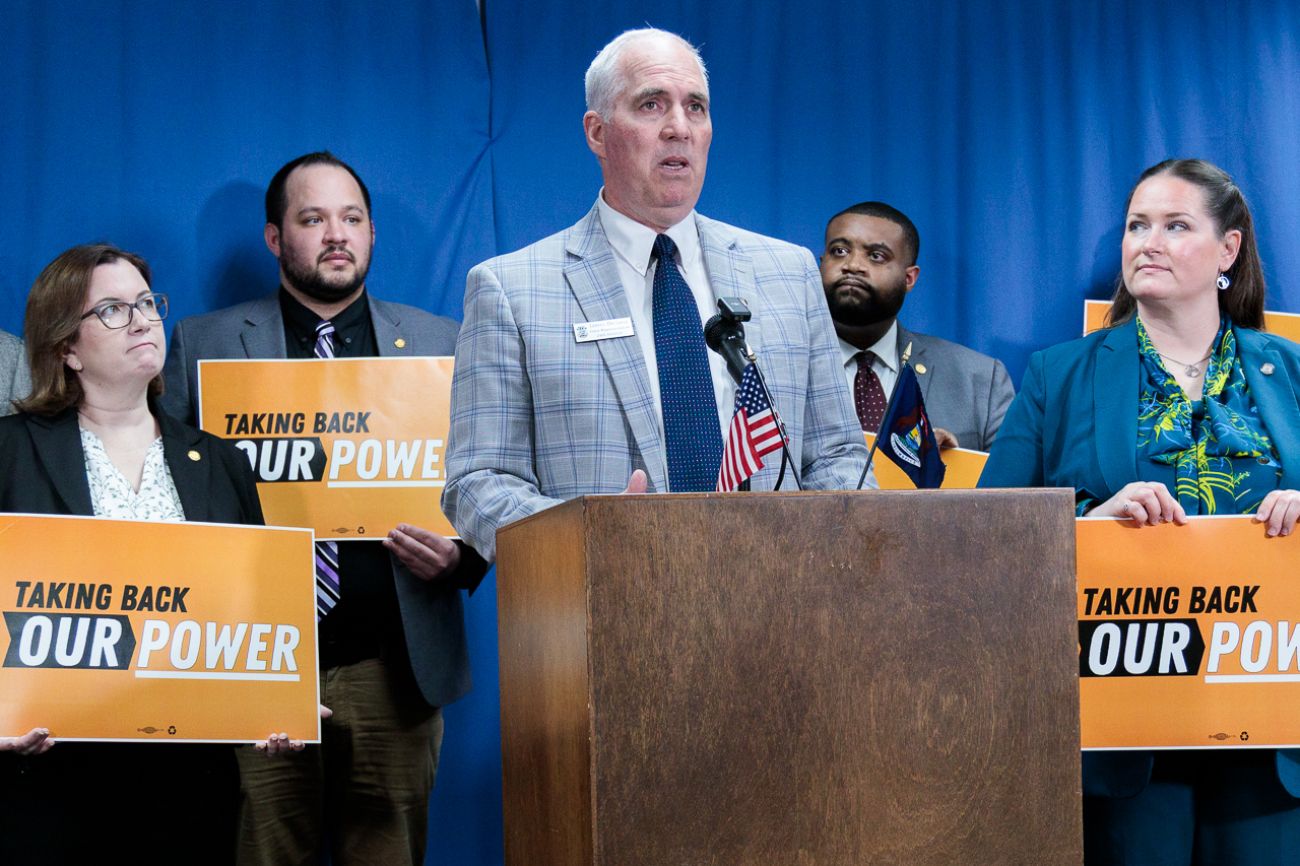Michigan proposal aims to stop political spending by DTE, Consumers

- Bipartisan legislators want to block Michigan’s largest utilities from spending in elections
- 120 of 148 state lawmakers took money from PACs affiliated with DTE and Consumers in the last legislative session
- A similar proposal failed to gain any traction under Democrats last year
LANSING — A handful of lawmakers are again trying to block Michigan utilities and major government contractors from making political donations, seeking to limit the sprawling influence of some of the state’s most prolific political spenders.
A bipartisan group of House lawmakers backed by a coalition of activist groups called Taking Back Our Power on Wednesday announced a four-bill package that would ban political contributions by DTE Energy and Consumers Energy, along with other corporations seeking large government contracts.
Michiganders of all political stripes and backgrounds “want corporate influence out of politics,” argued Rep. Donovan McKinney, D-Detroit, a co-sponsor of the package. “This is an opportunity to bridge that gap, bring everybody together.”
Lawmakers introduced similar legislation in 2024, when Democrats controlled both chambers of the Legislature, but the bills never received a hearing. They’re hoping they might be given more of a chance this time around under new leadership in the House, where Republicans now hold a majority.
“I think it's a great sign that we were at least able to use (a legislative conference room to unveil the bills),” said Rep. Dylan Wegela, a democratic socialist from Inkster who caucuses with Democrats. “I know that sounds so simple, but last session, that wasn't necessarily the case.”
Related:
- Days after storms, thousands still without power. That’s the norm in Michigan
- Utilities gave big to Michigan lawmakers now weighing reforms, records show
- Michigan near tops in nation for outages. Utilities want to raise rates
Consumers and DTE — incumbent utilities that provide energy to a majority of homes and businesses in Michigan’s Lower Peninsula — have spent millions of dollars in Michigan elections to boost candidates they favor, largely through “dark money” nonprofits that don’t have to disclose their donors but can spend and give unlimited sums.
A Consumers-funded nonprofit called “Citizens for Energizing Michigan’s Economy" has run social media and television ads touting their preferred candidates — both Democrats and Republicans alike on unrelated issues like climate change action and fiscal conservatism.
In the last election year with disclosures available, 2022, the organization reported spending nearly $4.6 million. Michigan Energy First, a nonprofit linked to DTE, spent close to $4.9 million that same year.
The bills would prohibit the utilities from giving to those types of nonprofit accounts as well as similar 527 organizations.
A Consumers spokesperson responded to the proposal by defending the company’s political involvement.
“We conduct our business with a keen focus on compliance and transparency, and that includes our participation in the legislative and political process,” the spokesperson, Katie Carey, in a statement.
Likewise, DTE said in a statement the company is “committed to being a responsible corporate citizen and complies with all applicable laws regarding corporate donations and political contributions.”
Critics contend the political spending has discouraged Michigan officials from doing more to force the utilities to improve service for ratepayers.
After ice storms left broad swathes of Michigan in the dark for days in 2023, lawmakers promised hearings and changes to improve Michigan’s electrical reliability, but no significant legislation emerged.
Michigan residents continue to experience by far the longest outages of any state in the Midwest while paying some of the highest rates, according to the most recent data from the US Energy Information Administration.
Rep. Jim DeSana, a Carleton Republican co-sponsoring the new legislation to ban political spending by the utilities, tied his support to a belief in a free market.
“I want all of my constituents to know that I'm here to serve them, not corporate interests and state-regulated monopolies,” DeSana said, suggesting there is “an openness to these ideas” in the Legislature.
Carey, with Consumers, emphasized that political donations come from shareholders or voluntary contributions from employees. Corporations cannot directly give to campaigns in Michigan, and it’s unclear if the legislation could slow the flow of dollars from an employee-funded PAC.
Victor Jimenez, of the Michigan League of Conservation Voters, said his organization is “challenging lawmakers to refuse money from big energy utility companies.”
That may be a tough sell.
In the last legislative session, DTE or Consumers-affiliated political action committees gave contributions to 120 of 148 legislators’ campaigns or leadership PACs, nearly $560,000 over two years. The contributions were bipartisan, and almost evenly split between lawmakers and related leadership PACs from both major political parties.
The largest recipients of Consumers and DTE donations last term were the leaders of each chamber, former House Speaker Joe Tate, D-Detroit, ($46,000) and current Senate Majority Leader Winnie Brinks, D-Grand Rapids ($26,000).
The third largest recipient was state Rep. Matt Hall, R-Richland Township, who is now House Speaker. He and his related leadership PACs accepted $24,500 from the utilities in 2023 and 2024.
See what new members are saying about why they donated to Bridge Michigan:
- “In order for this information to be accurate and unbiased it must be underwritten by its readers, not by special interests.” - Larry S.
- “Not many other media sources report on the topics Bridge does.” - Susan B.
- “Your journalism is outstanding and rare these days.” - Mark S.
If you want to ensure the future of nonpartisan, nonprofit Michigan journalism, please become a member today. You, too, will be asked why you donated and maybe we'll feature your quote next time!




